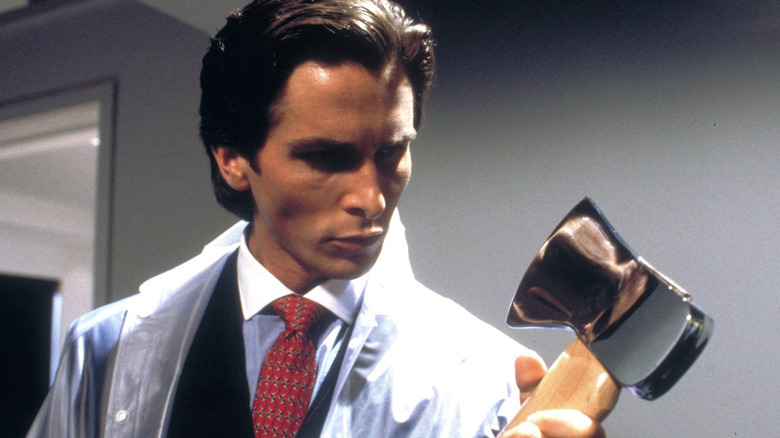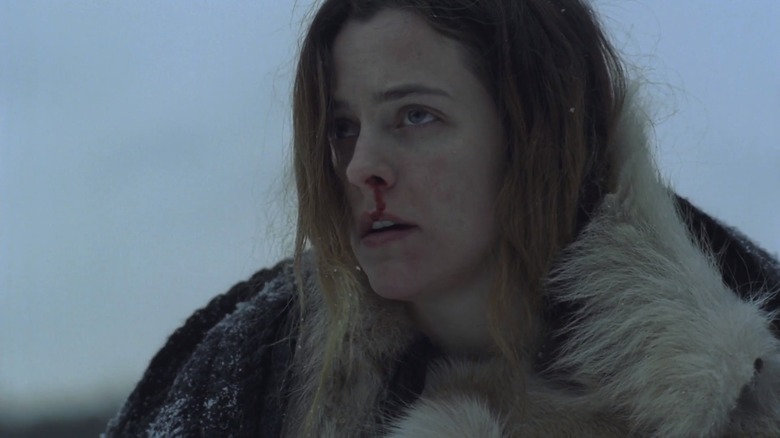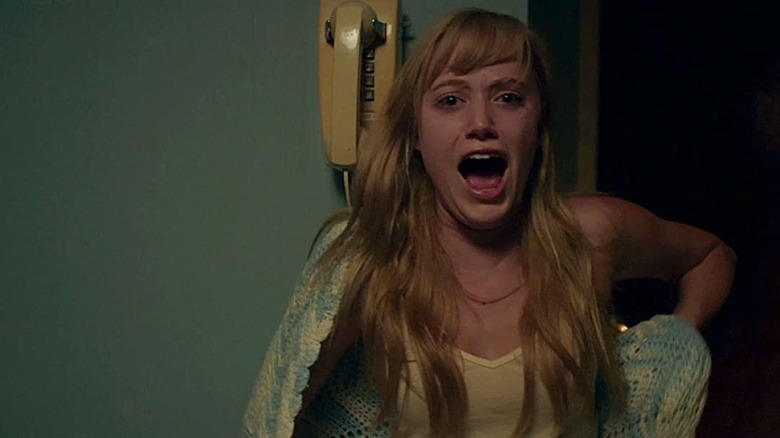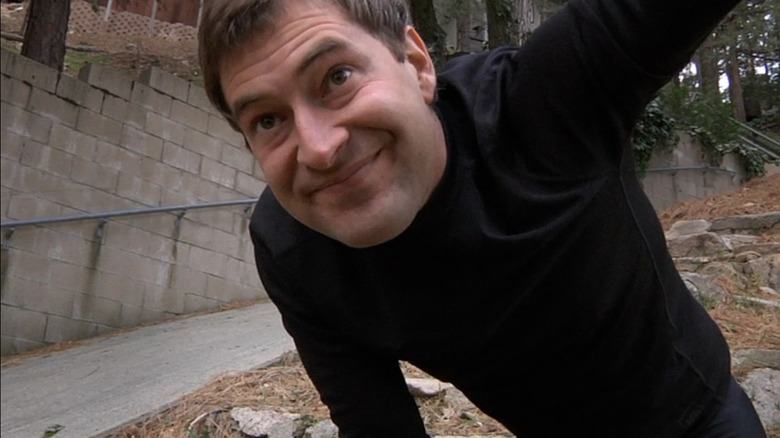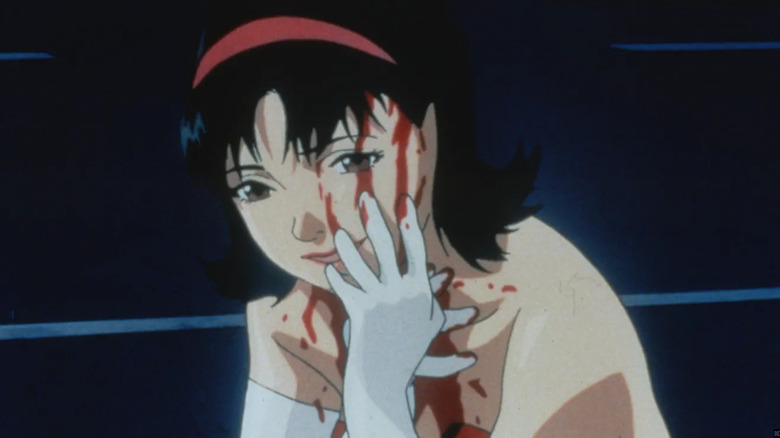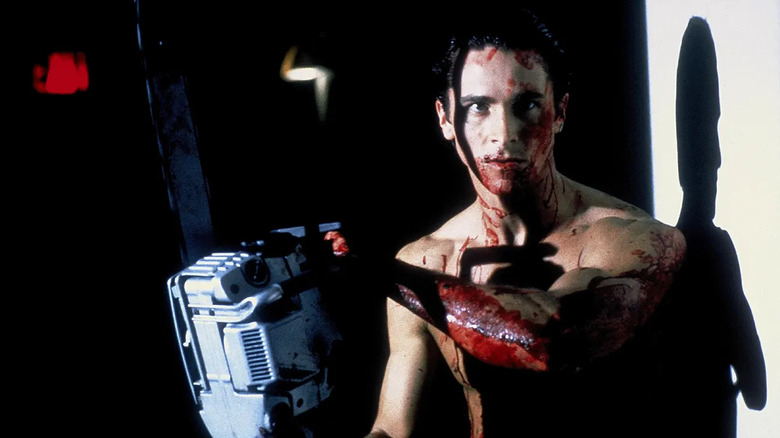Psychological Horror Movies Most People Could Actually Survive
While fear is one of the universal emotions that all human beings experience, what causes that fear is specific to each and every individual. For some, haunted houses keep them up at night, while others are terrified by the sight of a masked killer. What scares a person is largely determined by their lived experience, like watching "Jaws" a little too young and becoming terrified of bodies of water. Some horror movies choose to scare an audience not by pitting a protagonist against a freaky force, but rather by getting inside the viewer's mind and becoming their own personal cerebral assassin.
By nature, psychological horror is designed to creep up on a viewer, crawl under their skin, and stay there. The head trips caused by these unsettling stories often force an audience to put themselves in the shoes of the characters and assess how they would react in similar circumstances. In many cases, the average person would be no match for the manipulative power of a psych-horror — but never fear, there are still plenty of situations the average person could probably survive.
(Warning: Spoilers ahead for "The Lodge," "It Follows," " Creep," "Perfect Blue," and "American Psycho.")
The Lodge
Familial separation is already incredibly tough, but when a tragic event occurs in response to it, finding a way to move forward can seem impossible. The snowy, spine-chilling film "The Lodge" from 2019 opens on a jarring moment, with matriarch Laura Hall (Alicia Silverstone) dying by suicide after learning her estranged husband Richard (Richard Armitage) is planning on marrying a much younger woman named Grace (Riley Keough), the lone survivor of an evangelical extremist cult he met while researching her family. Laura's death is understandably devastating for the entire family, but especially Laura and Richard's children, Aiden (Jaeden Martell) and Mia (Lia McHugh).
Aiden and Mia feel resentment toward Grace, and Richard foolishly tries to bring the family together by vacationing in a rural cabin around Christmas. After he leaves one day for work, Grace and the children begin experiencing unexplainable phenomena, like strange sounds and items disappearing, including Grace's antipsychotic medication. Grace is psychologically tortured for days as she goes through withdrawal, and by the time its uncovered that it was the kids messing with her all along, it's too late. Grace has regressed completely back to the mental state she was when she was trapped in a cult, which is a dangerous place for her to be.
Things don't end well for Aiden and Mia in "The Lodge," but most of us could probably survive this movie by remembering that gaslighting is bad. The abject cruelty of intellectually tormenting a cult survivor, even out of misplaced anger, is a line that few people would be willing to cross.
It Follows
When David Robert Mitchell's devastatingly tense "It Follows" debuted in 2014, it was largely considered one of the best horror films of the year. The concept is so simple it seemed impossible that it could be effective, but paired with terrifying visuals and a masterful score from Disasterpeace, "It Follows" kept audiences screaming. The story follows a young woman named Jay (Maika Monroe) who after sleeping with her new boyfriend, Hugh (Jake Weary), learns that he has passed on to her a sexually transmitted curse. A mysterious entity intent on killing her will always be walking directly toward her no matter where she is, shapeshifting into different forms to disguise itself, until she passes it on to someone else.
In an ironic twist, the average person could survive "It Follows" simply because society is currently having less sex than ever before. It's pretty hard to spread a sexually transmitted death curse if there isn't any sex taking place. Unfortunately for those that are engaging in casual sex, sexually transmitted infections are skyrocketing, so make sure to get tested often and disclose any potential conditions you may have — including the ones that will manifest a vision of a deceased parent as a harbinger of death. Stay safe out there.
Creep
Found footage movies often deal with unexplainable happenings, but Mark Duplass and Patrick Brice's "Creep" and "Creep 2" present horror as the starring player. Brice plays a struggling videographer named Aaron who answers an online ad for a terminally ill man named Josef (Duplass) who wants to be filmed for a day as something for his unborn child to remember him by.
As Aaron and Josef go on their filming adventures, Josef's requests become weirder and weirder, and Aaron eventually bails on the situation only for Josef to begin stalking him. The entire film is an exercise in witnessing how many red flags people will willfully ignore out of fear of appearing rude or breaking an established social contract, and how being polite is often what makes us targets for predators.
Aaron did not deserve to be killed by Josef at the end of "Creep," but Philip Markoff, aka "The Craigslist Killer," had already been arrested years before the movie came out for using the website to target his victims. Hopefully, few people would be willing to go alone to meet a stranger they only know through a Craigslist ad, if they meet them at all. Thanks to the surge in popularity of true crime, the average person is more vigilant than ever before. Peachfuzz doesn't stand a chance against someone who has consumed hundreds of hours of true crime documentaries and podcasts.
Perfect Blue
The 1997 anime film "Perfect Blue" is such an astounding work of psychological horror, it's no wonder that Darren Aronofsky has incorporated elements of the film throughout his work. Directed by Satoshi Kon and loosely based on the novel "Perfect Blue: Complete Metamorphosis" by Yoshikazu Takeuchi, "Perfect Blue" tells the harrowing tale of a pop idol named Mima who leaves behind the wholesome world of singing bubblegum pop music to pursue a more serious and mature career as an actor. As Mima is forced to endure the brutality of the entertainment industry, she is suddenly swathed in tragedy. People close to her mysteriously wind up dead, and after seeing what appears to be a doppelganger of her pop idol self, Mima starts to question her own sanity, believing her former persona has taken on a life of its own.
Given the way "Perfect Blue" explores the themes of online personas versus real life existences and the dangers of obsessive fan culture, the film has only become more relevant as time goes on. As devastating as this reality is to reckon with, the average person would survive a story like "Perfect Blue" simply because most of us will never reach the level of pop notoriety as Mima. Many people might, however, become a spectator to a similar event and should hopefully have learned something from the way Britney Spears was treated in the public eye to speak up and help someone like Mima.
American Psycho
Patrick Bateman in "American Psycho" may be one of the all-time great horror movie villains, but his elitist attitude would fortunately allow the average person to escape his reign of terror. Based on the Bret Easton Ellis novel of the same name, "American Psycho" centers on a handsome white-collar professional in 1987 New York City, who moonlights as a serial killer in his spare time. The film is a wry takedown of toxic masculinity, blending horror and black comedy as a means to satirize yuppie culture, consumerism, and patriarchal gender performance. Patrick Bateman is presented as a meticulous and particular human being, craving and desiring only the very best.
This means that most people would never have to worry about crossing paths with Bateman, as few would ever be deemed worthy of his time and attention. Even when Bateman is soliciting the company of sex workers, he is extremely picky about the type of girl he will accept, and is furious when he doesn't get what he wants. While most of society would fortunately survive Bateman's homicidal tendencies (especially because the crimes may have been in his head all along), his day job as an investment banker would arguably have a greater impact as we're all at risk of being screwed by the stock market. As is often the case, capitalism is the real villain here.
